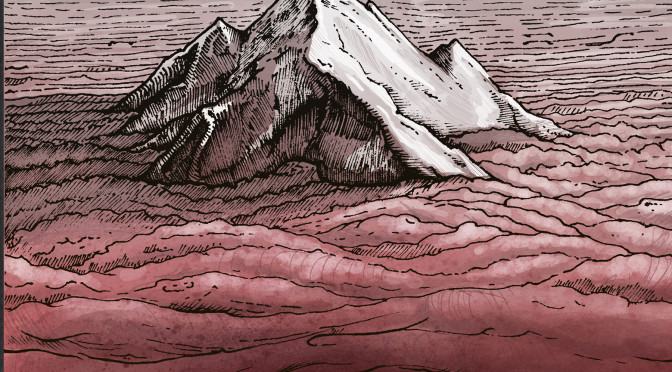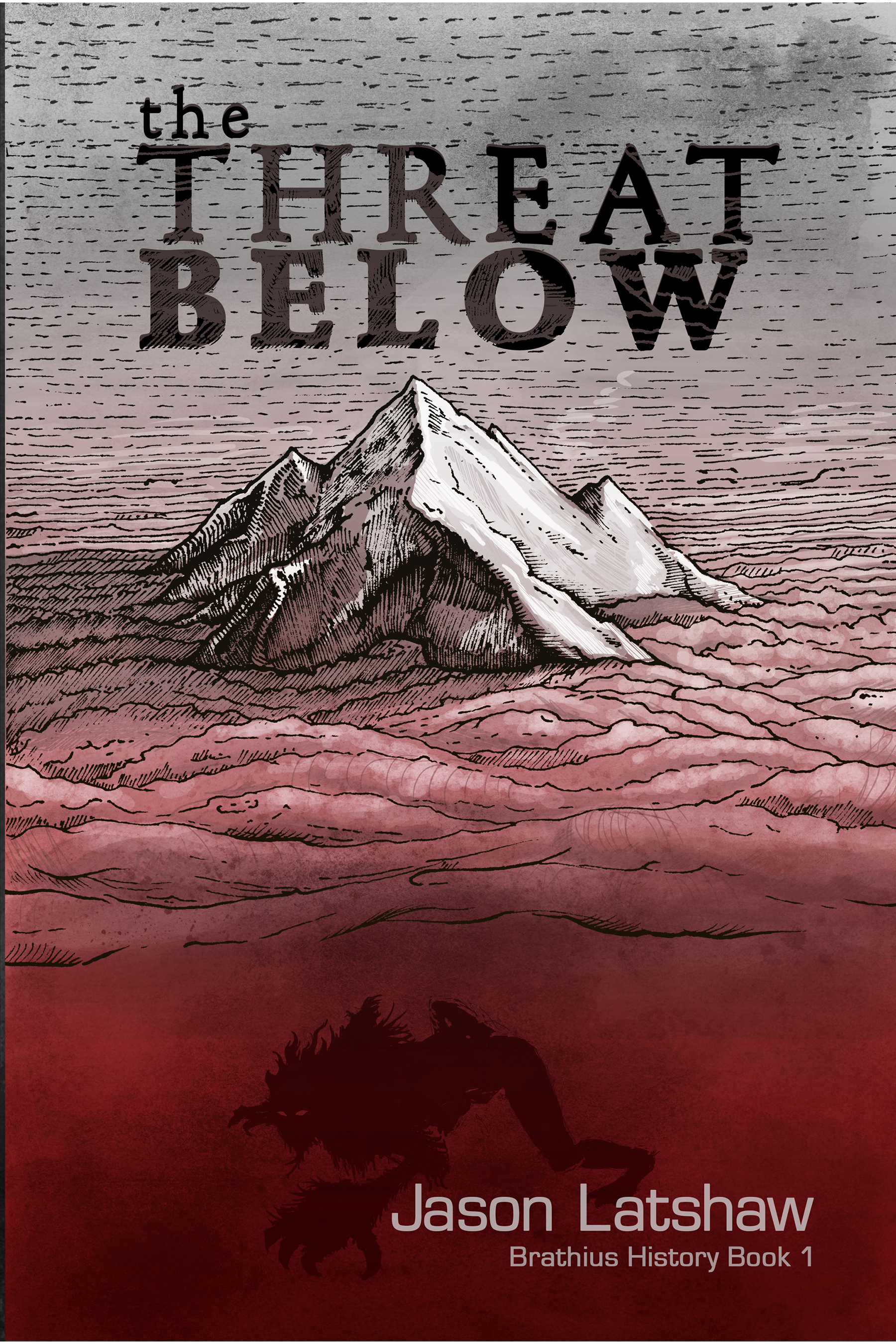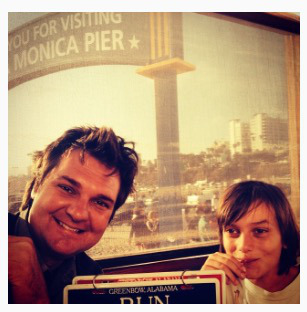As Summer draws to a close, it’s the perfect time for another interview! I’ve said it before, but it’s always a nice touch to have some back and forth with other authors here. In this case, I have the privilege of talking with Jason Latshaw, author of The Threat Below. We promoted his book two weeks ago, and found it very interesting. I’ll let Jason tell you why:
Tellest: Let’s start with a somewhat generic question. How did you come up with the concept for The Threat Below? What inspired you take on this dystopian fantasy?
Jason Latshaw: I moved from the east coast, from an area where everything was flat and there were no mountains, to southern California, and I love hiking in the nearby mountains as much as I can. Many times earlier in the day or later at night while I’d be hiking on a ridge, trail clouds would roll in, and I wouldn’t be able to see anything at lower elevations. Literally nothing at all. I started to imagine what it would be like if it was always like that, and the world below the clouds was a huge mystery to me. I loved the idea of a place so close being so dangerous and scary.
T: Did you know ahead of time that the two aspects of the story—the dystopian future and the diminishing resources—would be part of the same story?
JL: Yes, the drought that California has suffered the past few years has made both of those aspects of the story almost seem like present-day realities! I’d never even thought about where water came from before I moved to the west coast, but now I think about it all the time. Whenever I discover a new place, I’m trying to figure out what the water source is, and how stable and reliable it is. It’s actually what I miss most about the east coast – all the creeks and rivers and lakes and ponds, all taken for granted by the people who live there. Fresh water is so rare here.
This inciting incident, that a people are being choked out of where they’re living because the water is no good anymore, that’s something I do worry about late at night. I think this is a dystopian future that people can kind of see happening, honestly… we do have finite resources, or at least they seem finite to us at this point, yet we aren’t really very good at rationing, or slowing down our birthrate, or anything like that. So I think you give it 300 years and people think, yeah, I could see that kind of terrible event happening. But then they’ll think, good thing I’ll be dead by then. (And that’s probably why we won’t do anything about it now.)
T: Your protagonist is in some ways far displaced from most people. Though she’s a lot like most teens, she’s living in a time and place much different than us. Do you find it challenging to write from the point of view of someone like Icelyn?
JL: I have a teenage daughter, who I adore, and who has inspired Icelyn’s character for me. (Though I’ve definitely given Icelyn some flaws that aren’t present in my daughter, and mixed myself in there too, and of course Icelyn has since sprung to life as her own person, too.) So because I’m pretty close to my daughter, I didn’t find it all that challenging to write from that point of view. I feel like I relate to her viewpoint on a daily basis anyway, and, as a parent, am constantly trying to be cognizant of what she’s going through, what she’s feeling, and what she wants or needs. To be as empathetic to who she is as I can. So my daily life is good training for writing from Icelyn’s perspective.
You mention this place that’s far displaced from our own – so much so that for Icelyn our time takes on almost a mythical treatment, like legends that she can barely believe. I enjoyed very much putting this character that sprung from my daughter into a brand new world that is primitive yet post-modern at the same time. I’m not exactly against technology – I use it as much or more than the next person, but for my storytelling instincts, I love a world with very little of it. People in this story have to talk face to face, and travel great distances, and figure out non-trivial solutions without the use of readily available products. I like this idea of putting a teenage character into a primitive world. Yet at the same time she has these sensibilities born of (our) modern world. It’s been a fun dynamic for me.
T: That brings up another interesting concept. There are, of course, traces of the past in your story. The apriori (love that word choice, by the way) still exist in these fleeting ways. How did you determine how much or how little of the past to include in this novel?
JL: I love archaeology and anthropology, and am fascinated by this concept that once civilizations get far enough in our rear view mirror, they are so foreign to us that we have to explore and investigate and suppose just to figure out how they might have lived, as if they are aliens on another planet or something, and not humans just like us. So basically I looked at Mountaintop’s knowledge of the Apriori as being similar to our understanding of the Anasazi or ancient Romans. We look back and almost mythologize these civilizations. And yet, for Icelyn, the Apriori culture was so foreign to how she was living, so when she actually got to witness it or the remains of it, it stunned her. I included whatever I thought would make an impression on Icelyn – the magical technology and buildings and cities that we take for granted, the (from her perspective) “beastial” aspects of our culture, like over-reliance or emotions and sensuality and even religion. I had a ton of fun viewing our civilization as a distant far away dead culture, and look forward to exploring it more in future books. I think the question of “what of what we’re doing now will actually be remembered, would actually last?”
There’s an old cartoon that my mom showed me when I was very young, where archaeologists were digging and excavating a common living room, and find a television with all the chairs and couches oriented towards it, like it was the center of the room. One of them comments “Clearly this box holds some mystical or divine qualities, for look at how they were all facing it.” I think the idea behind that cartoon was the seed for the Apriori in these books. There’s a truth in what the archaeologists were saying about the television that we living in this time period might not even be able to recognize, yet at the same time they’re way off in their theory of what this box is. I think exploring our modern culture from this same future-looking-back POV yields similar fun insights.
T: Icelyn is witty, capable and determined—an appealing set of traits for readers of any age and gender. How do you think you made her such a likable character?
JL: Icelyn is a mixture of my daughter and myself, so of course I’m going to have a lot of affection for her. (That’s meant to be a joke, mostly, but not really.) I think my affection for her shines through. She’s stubborn and headstrong yet also very honest, and people enjoy and respect that about her.
A lot of what I like about Icelyn is rooted in her contradictions. I did set out to make her capable and not dependent on others for rescuing all the time, yet she is also very vulnerable and often wishes that others would just make everything better for her. I think it’s a good mix for a character, female or male. Strong but needy at the same time. She lives in a world where everything is in flux and chaotic, and yet she likes to believe that there’s this structure that is fairly black and white. I think everyone can relate to this tension. She can be funny and light-hearted and playful one moment, and then deathly serious and grim the next. I think many people, and especially young adults, can relate to these kind of sudden swings. They happen all the time.
I appreciate that you think she’s likable – I do too – but some people definitely do not. She frustrates a lot of people, because they read her as overly dramatic, or thinking about the wrong things when there’s more important matters to attend to. But to me, that’s authentically human. I’m not even going to say that’s just authentically teenage or young adult behavior, because that’s patronizing. Honestly, everyone does that, regardless of age.
One aspect of Icelyn that people respond well to is that, while she cares very much about the possible romantic entanglements in her life, ultimately they aren’t the most important priorities to her, as painful as that is. She is definitely not a girl just looking for a guy to give her life meaning. Yet she feels that pull. There’s a strength in seeing that some things are more important than a romantic relationship, and I think people admire the sacrifice that she’s making.
One last bit that I did add to Icelyn’s character consciously was a casual bias (against Veritas, against religion, against displays of emotion, against animals, against singing, against so many things), like a member of the British aristocracy who benefits from all these injustices built into society and simply thinks that’s the proper way that things should be. I think it can be maddening for some, but I like Icelyn’s blind-spots. We all have them, and more than often they aren’t choices that we know we’ve made.
T: The people of Mountaintop live in almost a kind of caste system. What inspired the concept of the Kith, the Veritas and the Cognate?
JL: The hierarchy that they use to align the classes in Mountaintop, for me, grew out of the story, and what happened 300 years ago. To me, it was a natural extension from that history. Beyond that, though, I had been thinking a whole lot, for some reason, about why humanity is such a successful species, when really we’re outgunned in so many seemingly vital ways by other animals.
They’re faster than us. They can fly. They can breathe underwater. They’re stronger. We’re slow, small, weak… But we’re smart.
I liked the idea of a society taking this concept and running with it, that they organized according to what they saw as our uniquely elite trait, our intellect and knowledge.
T: Because this takes place so far in the future, there’s plenty of time that’s passed between major events. Do you think we’ll ever see what transpired a little more clearly between the start of the disaster and the time period in which Icelyn lives?
JL: Funny you should ask. Yes. The second book in the series, which I’m working on and hope to have out by next year, does explore two different timelines. Just prior to and after the Ascension into Mountaintop 300 years ago, and then the continuation of Icelyn and the rest’s stories, too. There is a whole lot of story to tell about that time period. Just about every major character in The Threat Below has an ancestor during that earlier time who will do something important.
T: With that in mind, is it difficult working with characters that you know are going to have their lives uprooted (or even ended) brutally?
JL: Oh yes, absolutely. But that’s not limited to the approach I’m taking in second book. There is one character in particular who dies in The Threat Below that I still regret whenever I think about it. I loved him. But that’s how you reflect life and weave a compellingly authentic tale, I think. It’s the simpler forms of entertainment that keep the good people alive and kill off or punish those who “have it coming.” In life, good people often do die way too early, and bad people can seem like they live forever. That’s part of the unfairness of life that people have been railing against since ancient times, and fiction is a good place to try to work those matters out.
Really though, this “earlier timeline” approach isn’t any different from a writing perspective. For the Threat Below, I pretty much knew where everyone was headed while I wrote it too. Sometimes it is kind of ominous, and as you get to know and develop the characters more, becomes more painful to think about. Sometimes too, their destinies can change as you get to know them better. Torrain was going to die at the midpoint of The Threat Below, but the guy turned out to be quite a survivor, and I had to keep him around.
T: The cover clearly indicates this is only the first in a series (and you’ve also got a supplemental short story out). What are your plans for the future of this series?
JL: The plan right now is that there will be 4 books all together. I’ve got it all (mostly!) figured out, so it’s just finding the time to let my creative process run its course. My goal is one book per year. I’m a television and film writer, too, so finding the time for the novels requires a good amount of discipline.
T: Any plans on pitching this idea for TV? It could really give shows like Revolution a run for their money.
JL: I originally was going to write this basic idea as a film script, but I knew that no one would ever buy such a large world as a spec script alone. It just doesn’t happen anymore – for various financial and creative reasons, large fantasy stories almost always need “underlying material” – like a novel. I’d been wanting to write a novel for a very long time, so I thought, well let’s write the novel, because I loved the basic premise. It excited me. I wasn’t willing to let it go. So going in, I envisioned it as a film.
But it’s interesting that you mention it as a TV show. Once I had finished a draft of the book, and started reading it through for rewrites and revisions, (I read this book 17 times cover to cover, by the way, each time with its own rewrite) I did start to wonder if television wouldn’t be a better medium for it. There are so many great series right now that take their time. Television offers a kind of patient storytelling that doesn’t exist in films.
The answer is, yes, I would like to explore what it could be as a TV show. But I’m pretty protective of this world and story. It’d have to be high budget with really really smart talented people behind it. (Haha, beggars can’t be choosers, they say, but this particular beggar disagrees I guess.)
T: Well thank you so much for taking the time to talk with us about The Threat Below and whatever comes next. You sure have a lot on your plate, so this was a welcome treat. Good luck with your endeavors in writing this dystopian epic!
It really was a treat to work with Jason in getting the word out for his incredible book. The Threat Below is available on Amazon right now. Get it before the sequels come out, and say “I knew Jason Latshaw when…” And don’t forget to check out Jason’s work at his author website as well.
If you’re the creator of fantasy worlds and you would like to be interviewed for your work, contact us via the link in the menu bar.
Michael DeAngelo
Latest posts by Michael DeAngelo (see all)
- Sci-Fi Promo: Battlefield Earth: A Saga of the Year 3000 - April 18, 2024
- The Whispers – Chapter Ten - April 18, 2024
- Concept Art – Atalatha Arena - April 17, 2024


